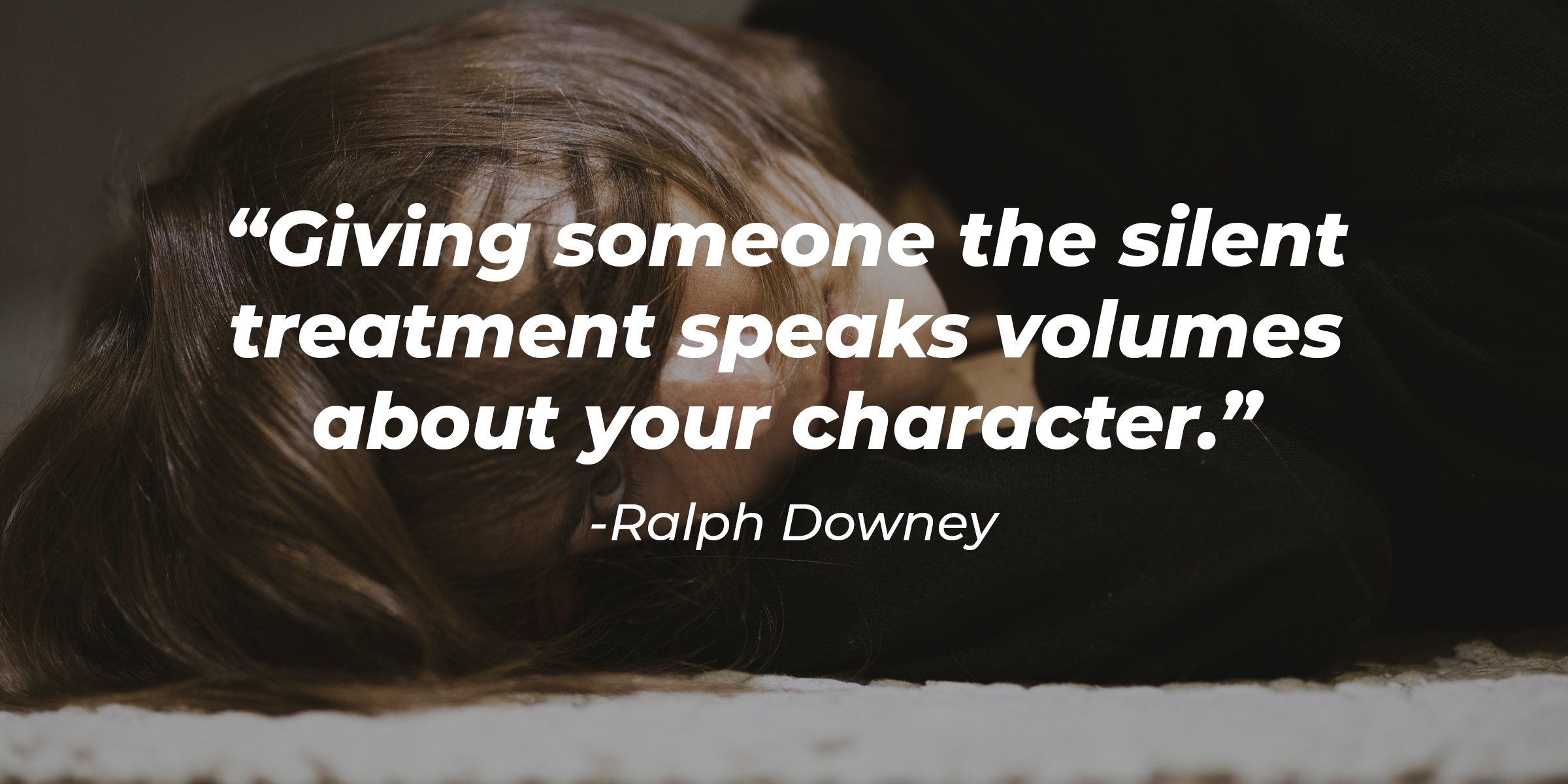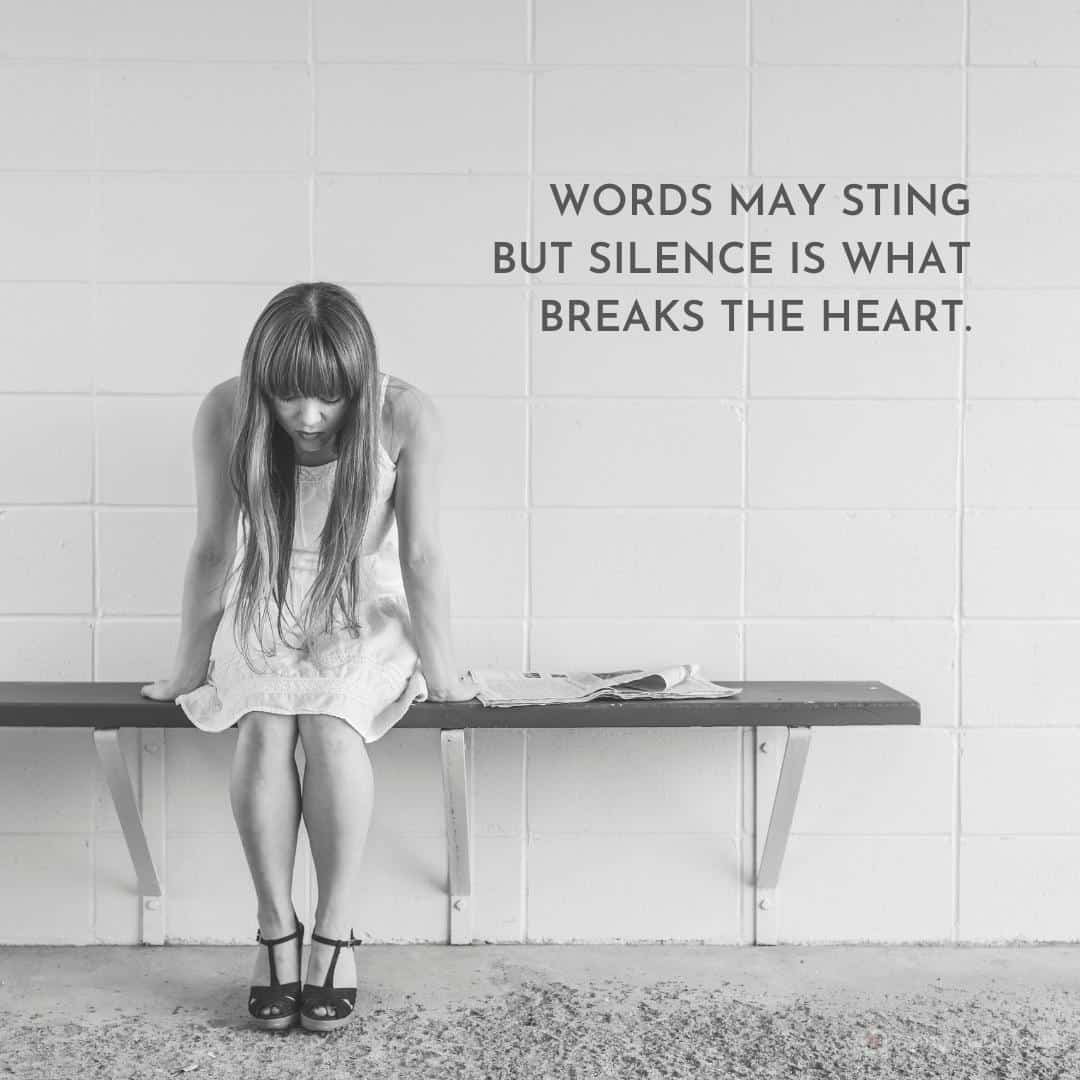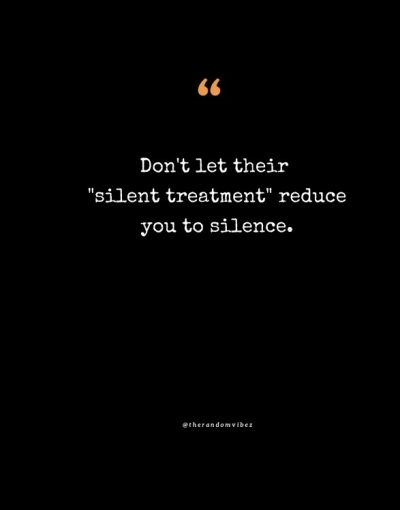Silence

Have you ever gotten in an argument with someone, and they stop speaking to you? Or worse, you expressed deep emotions, and there is no response. The other member of your conversation may be silent, but your brain is not. You begin analyzing everything you said, and didn’t say. You begin questioning everything. EVERYTHING. The silent treatment is a form of ghosting, and it’s unfair to both parties involved. Having the conversation—no matter how tough/uncomfortable–will always be better in the end. The receiver will know how you feel, and they can respond, and then you will know how they feel.
With how connected we are, there is no excuse for leaving messages unanswered. The use of silence as a communication tool is ever-increasing trend in the world. It’s rude. It’s immature. Yes, people behave poorly and mistakes are made, but not telling them what they did wrong, or how they hurt you, does not give them the opportunity to address the behavior, or apologize for it. There are toxic people and toxic situations, but generally, people are not intentionally out-for-you.

When the tough conversations arise, it might be easier to step away from the situation, to protect yourself from big feelings, and the other person, but communicate your needs to them. Say: “I need to process this.” There is no shame in taking time. Don’t leave people wondering what they did wrong for you to pull away. Yes, telling them you need time may still cause some anxiety, but they will at least know you’re still there. Silence often feels like one person has given up on the other, at least for the moment. Estrangement is a silent epidemic that impacts people all over the world. Estrangement, from someone close to you, creates an unexplainable loneliness. Loneliness with no defining characteristics.
There is no doubt that the silent treatment is intentional, though voluntary. However, if it goes beyond a short time, an estrangement is occurring. While similar, the two are very different. Both forms of non-communication can turn into rejection and abandonment.

Silence is a loaded form of communication. The psychological impact of estrangement is intense, but it’s potentially an ache without a cure. Eventual relief is a hope, not a given. In time, estrangement may eat away at self-esteem, confidence, and quality of life. Those who create the estrangement can be viewed as seeing themselves as better than the receiver of the silence. For the person creating the estrangement, blame placed on the other party, whether that is the intent or not. Relationships take two people, and no one is faultless. Often, if you’re on the rejected end of the silence, you may feel powerless and angry or resentful. Being silent, and remaining silent, can ruin a relationship. A day of silence may turn into weeks, months, or even years.
There are necessary reasons for estrangement, but there is loss that accompanies. This loss is undefined—it doesn’t happen all at once. Estrangement leaves hope the relationship will rekindle, so there is no closure. For the person rejected, moving forward in healing often becomes tricky, because you don’t know the relationship is truly over.
A particularly troubling part of estrangement is the psychological phenomenon of rumination. Angry reflection is common on both sides of the estrangement. Over time, these thoughts start to take the place of memory. Rather than remembering the person, or the good parts of the relation, our memories become the stories we have told ourselves about them. We question aspects of the relationship. We question ourselves. We wonder about their intentions.
Rumination often repeats itself and causes pain. The situation may be over, yet if it repeatedly replays in our mind, the pain and hurt also re-surface. If we don’t find the closure and healing, this pain can distract us from living a joyful life and may further impact the relationship between the people involved. Relationships are cycles of connection, breaks, and repairs. Estrangement is a break, and the repair of that break may never (of feel like) come. If we don’t repair relationships, we will miss out on all our relationships. There are some relationships that we cannot repair. It’s wise to be aware of relationships that have served their purpose in our lives. Estrangement, in this form, can be gradual or abrupt Setting new boundaries with people can cause estrangement. We can still be cordial with those people. Be kind if they reach out, but know, for you, the relationship is over. If conflict remains unresolved, a pattern will arise.
Estrangement is full of blame. Blame for the person estranged. If you tell people what the other person did, others may judge them for what they did, or they may judge you for cutting them out of your life. You may be blamed for the other person’s actions causing the estrangement.
Estrangement causes grief for both parties. Grief is often process through community. Estrangement removes that community aspect; creating a lonely grief. We may blame ourselves for what happened, which is typical in times of grief. However, if you can’t process your grief in community, the unshared nature of the shame becomes unchecked, deepening the emotional burden. Thers is no emotional support, only you.
Estrangement threatens our basic sense of well-being and security. It causes chronic stress, which impacts both your physical and mental state. People describe estrangement in precisely these terms: a form of chronic stress that never goes away. Karl Pillemer, PhD described it as this, “Like a chronic illness, in estrangement, flare-ups are followed by periods of relative calm but colored by worry that things could easily take a turn for the worse. Persistent rumination and “awfulizing”—imagining that the situation is the worst it can possibly be—thus add to the chronic stress.”
If you’re the receiver of estrangement, remember to forgive yourself, if you’ve done something wrong. Be gentle with yourself. Love who you are, even if mistakes were made. Don’t let the pain define your life, or who you are. Don’t dwell on the estrangement. Focus on positive feelings/energy. Invest in positive relationships and people. There is much to be thankful for, and a lot more than pain. Try new things. Go on walks—even if it’s 10 minutes in the neighborhood. Accept the reality of what is now. Don’t beg for forgiveness or reconciliation. Work on you, and how you can be better—whether you know what you did or not. Bettering yourself is truly the best way to show you want to right what’s wrong.
Whether you’re the person retreating, or the estranged party, know everything will work out how it’s supposed to work out, and you will heal when you’re ready.

